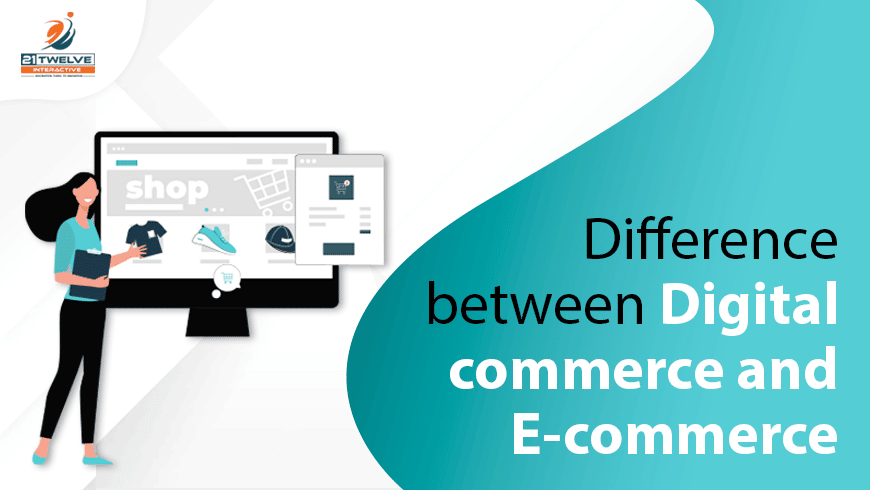
Regarding function, e-commerce is closer to culture than a role. E-commerce, or electronic commerce, is the process of doing commercial transactions online. This covers a broad spectrum of tasks, including handling supply chains, making an online storefront, and handling transactions and receiving payments. However, as we have seen, there is more to being successful in e-commerce than merely being able to sell online. As a result, new fields have emerged, such as digital and electronic commerce, respectively. Here is a guide to digital commerce vs. eCommerce.
Table of Contents
Elements of electronic commerce:
If “nuts and bolts” describes what happens when you sell something online, then “digital commerce” describes what happens when you combine people, technology, and data-driven processes to take brick-and-mortar stores to new heights. These are all elements of an eCommerce shop.
- Content management
- Data querying and analytics
- User design and experience
- Customer involvement and customer retention
One of the most exciting developments in business is the meteoric rise of online shopping. Retailers, big and small, have been impacted by the convenience of online buying.
Ecommerce development companies should be given much credit for turning this digital dream into a workable reality, as the Internet has leveled the playing field by enabling businesses of all sizes to promote to consumers worldwide through online channels.
E-commerce development relies on various technological solutions, such as electronic money transfer, mobile commerce, internet marketing, supply chain management, online transaction processing, and automated data collecting systems.
What Do You Need to Know About Shopping Online?
“D-Commerce” (short for “Digital Commerce”) is the subset of “e-commerce” that deals with the digital distribution of goods. Online commerce and product delivery are rapidly becoming the norm in the corporate sector. Thus, businesses can save time and effort compared to individual visits to each customer’s location to deliver products and services.
It also allows companies to provide customer support, make sales, and promote their products at a lower cost than they would be able to with more traditional methods of communication. This has helped businesses grow their sales by increasing their online presence.
Brand recognition, customer interaction, sales tracking, account maintenance, and repeat purchases are now one fluid process in online eCommerce. Companies have invested heavily in state-of-the-art e-commerce systems over the past decade, allowing consumers to compare prices, read customer reviews, and learn about a product’s quality without ever leaving their homes.
The outcome has been a surge in sales and the introduction of cutting-edge client services. You can also hire an eCommerce development company.
What Sets Apart Electronic and Digital Markets Unique?
“Digital commerce” refers to all the business between businesses and consumers on the Internet. It encompasses novel digital products like online courses, digital subscriptions, and digital iterations of traditionally offered commodities like digital music and e-books.
The term “digital commerce” is commonly used interchangeably with “e-commerce,” which refers to online purchases. Unlike digital products, E-commerce products such as wholesale frames, can be physically delivered to customers by email attachment or hard drive.
When selling a digital item, all you need to do is send buyers a link to its spot in cloud storage or an online archive; when selling a physical object, however, you may need to follow different steps.
You can’t, for example, expect to sell thousands of copies of your latest e-book if you market it by linking readers to Amazon’s cloud storage, where they may download it for free. Use an online store to peddle your digital stuff. With this strategy, you can keep 100% of the money from a sale instead of sending any of it to Amazon.
The capacity of businesses to provide products to customers without defects is a significant advantage. Consequently, buyers may have faith that their packages won’t leak, crack, or arrive damaged in any way. It also guarantees that the product will last forever without breaking or being worn out. However, e-commerce avoids all these problems, resulting in contented buyers and better outcomes.
Online shopping has exploded in popularity since the advent of e-commerce, but the sector isn’t without problems. In e-commerce, the manufacturer handles returns, and the firm issues refunds, despite customers having many questions and concerns about both processes.
However, you can’t expect to get the same kind of support from shopping online. Unfortunately, many online stores don’t make it easy for customers to get their money back if they change their minds.
When selling via a channel like e-commerce, automating your sales process is crucial for making the most of your time and resources—a fantastic strategy for growing your business and gaining new customers.
New sales channels on your favorite platform can be set up with only a few clicks of your mouse. Automating your business’s marketing and sales procedures is a terrific way to free up growth time.
Concerns about wasting time and energy on product modification are a big reason why some consumers hesitate to shop online. When using a service like Uber, the customer dials a number and waits for the driver to come.
This level of customization isn’t always necessary because shoppers can browse the shelves at traditional businesses without ever interacting with a salesperson. Customers often consider a lack of customization options as the biggest drawback of online shopping, which is why many stores still emphasize brick-and-mortar shops.
Internet shopping and digital commerce perform complementary but distinct roles. We call “e-commerce” the buying and selling of products and services online. Customers prefer to shop online or using a mobile app rather than at a physical location. It’s the ultimate in virtual amusement.
☛ E-commerce does not mean digital commerce
E-commerce, or electronic commerce, describes business dealings that occur solely online. Businesses are using digital commerce methods that make the experience of shopping online exciting and engaging for customers to draw them in and urge them to make purchases.
Digital commerce is defined as “letting customers interactively buy goods and services independently,” It encompasses the processes, end-users, and technologies necessary to provide development content, customer acquisition – retention, pricing, and customer experience along the customer’s shopping journey.
☛ The primary goal of e-commerce is to facilitate easier transactions between buyers and sellers
With the introduction of e-commerce, businesses were able to enhance the purchasing and selling experiences of their customers and themselves. However, with the help of online commerce, you may make one that is a lot more spectacular.
As was already established, simplicity of use is highly valued by consumers. They need their questions to be answered and their problems to be fixed. They need them right away, too.
Make your clients’ lives easy by giving them exactly what they want without extra effort. You can help your customers acquire the information they need, immerse themselves in a pleasurable experience, and remember your brand in the future by providing features like fast page loading, personalized product suggestions, and straightforward search tools.
Here, you’ll find the secret to a truly unique and fruitful sales process. If customers can quickly get the information they need, they will be less likely to contact sales or support staff for help. As a result, teams may prioritize assisting the most desperate clients (e.g., sales quotes, project proposals, etc.).
It also helps your sales team close deals with potential customers if you operate in the B2B sector. I’ve already gone over how supplying visitors with quality content can improve their experience on your website.
Potential buyers may have questions about your company or the goods you’re selling before they commit to making a purchase. Now is your chance to shine as an authority if you have information that can satisfy this need.
The key to being a recognized expert in your field is consistently delivering valuable information that assists your intended audience. You’ve done a great job optimizing your content for search engines so that readers can find it without further effort. Customers will not feel rushed into making a decision and will value the time they are given to make an informed choice.
You must tread carefully; your products and services shouldn’t get all the attention. Additionally, such content needs to offer a clear path to the offering in question (i.e., add it to the basket).
Conclusion
The retail industry has significantly benefited from the advent of online shopping, which has created new job openings and increased consumer spending.
Customers can now shop from the convenience of their homes, regardless of their physical location, and have their goods delivered to them in a matter of days rather than weeks, all thanks to the advent of the Internet. This has had a profound impact on the traditional retail industry, resulting in new businesses, the infusion of new capital into existing ones, and many new jobs.
FREQUENTLY ASKED QUESTIONS (FAQS)
- Business to business(B2B)
- Business to Consumer (B2C)
- Consumer to Consumer(C2C)
- Direct to Consumer(D2C)



